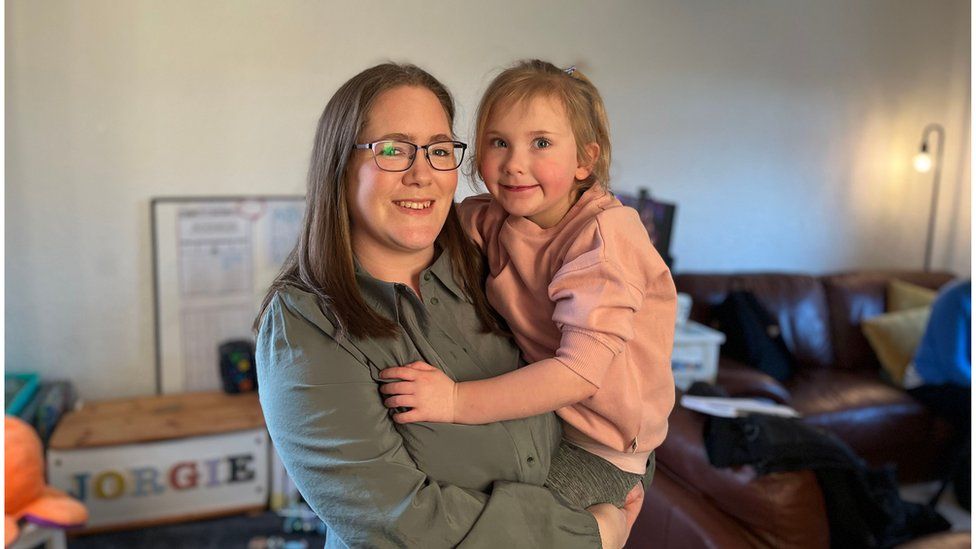ARTICLE AD BOX

Stacy Porter, who took on the care of niece Jorgie nearly five years ago, says the process was "incredibly confusing".
By Judith Burns, James Melley and Hayley Clarke
BBC News Social Affairs
Children's social care in England will be revamped with more early support for families, backed by £200m extra funding over two years, ministers say.
Last year, a major review, led by Josh MacAlister, warned tens of thousands more children could end up in care without reform and £2.6bn more funding.
"Children in care deserve the same love and stability as everyone else," said Children's Minister Claire Coutinho.
But Mr MacAlister said the government's plan needed to go "further and faster".
The plan also faces wider criticism that many of the changes are being rolled out as localised pilots rather than nationally.
It was put together in response to recommendations in Mr MacAlister's and other reports, which followed the murders of Arthur Labinjo-Hughes and Star Hobson in 2020.
The trials of their killers highlighted the inadequacies of a system meant to protect children at risk.
The government wants to "put families at the heart of reform", with better support for vulnerable children "to stay with their families in safe and loving homes", and reduce the need for crisis intervention.
Pilots in 12 local authorities will deliver:
- more early support for families struggling with challenges such as addiction, domestic abuse and poor mental health
- more family-type placements for children in care, with relatives, friends or foster families
- a recruitment drive and above-inflation rise for foster carers
- a simpler process and better training and support for relatives or friends who take on children
- finding homes near family, friends and communities will be a priority for children in care
- the leaving-care allowance will rise by £1,000 from April
- support for councils to recruit and retain more social workers
Mr MacAlister welcomed "notable measures" in the plans.
"Yet, without a whole system reset on the scale set out by the review, outcomes for children and families will remain stubbornly poor, more children will grow up in care and costs will continue to spiral," he said.
"The government's plan gets us started down the right path but it must go further and faster if it is to reach the tipping point of change that children need."
Annie Hudson, chair of the national Child Safeguarding Practice Review Panel, said that what happened to Labinjo-Hughes and Hobson "reinforces the importance of reform" across the children's social care system.
She welcomed the government's plan, describing it as "very broad in scope" and "bold in its intentions and ambitions".
She told the BBC Radio 4's Today Programme that the key to tackling issues within the children's social care system was the establishment of "multi-agency specialist teams" that work together "as one team".
"Unless we have that kind of approach we won't address some of the perennial problems of fragmented information systems, fragmented decision-making that we saw with Arthur [Labinjo-Hughes] and Star [Hobson]," she said.
Children's Minister Ms Countinho said the government was "setting out an ambitious set of packages to start a transformation in children's social care".
"What we're trying to do is make sure that families can get the early help that they need, they don't end up escalating in crisis and we can keep more families together," she said.
Rolling out some changes as local pilots was "to make sure we've got the exact right approach as we push forward", Ms Countinho told BBC News.
'Long overdue'
Stacy Porter, who took on the care of her niece, Jorgie, nearly five years ago, says the process was "incredibly confusing".
The 33-year-old feels lucky to live in Durham, where a council-run kinship team offers support and guidance "worth its weight in gold".
She says the government's promises of better training and support are "brilliant and long overdue" but is frustrated there is no commitment to a kinship payment, similar to a foster-care allowance, despite it being recommended in the review.
Stacy stepped in to avoid Jorgie being adopted or put in care
Since 2010, pressure on council budgets has seen early support for vulnerable families cut in many areas but the government now acknowledges early intervention can prevent problems escalating.
Shani Smith's four-year-old son, Ellis, has severe autism and she says the support the family have received through their local children's centre, in Camden, north London, has been crucial.
"The nursery have just been amazing," she says, "their staff have just been fantastic.
"Ellis now says four words - we never thought he was going to even talk. Early intervention was a big thing for him."
Shani Smith says the support her family has received has been amazing
Camden council's director of children's services Martin Pratt says the focus on early intervention, involving teams of NHS staff, council workers, voluntary and community groups and parents, has meant "a dramatic and sustained reduction" in the number of children going into care in the borough.
Keith Glazier, of the County Councils Network, agrees the emphasis on preventative services and keeping families together is key. But the funding "falls short... while the pilots are only taking place in a select few areas".
National Society for the Prevention of Cruelty to Children (NSPCC) chief executive Sir Peter Wanless warned without "substantial national investment and a reform programme delivered at greater pace", the government's ambitions would not be realised.

 1 year ago
31
1 year ago
31








 English (US) ·
English (US) ·